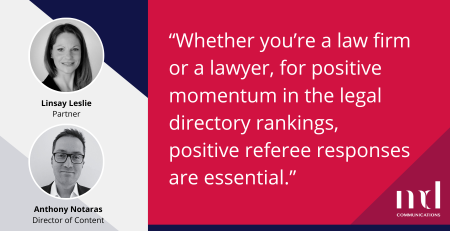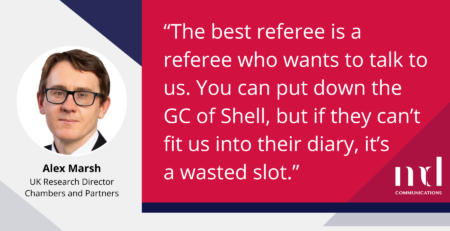With Legal 500 and Chambers UK rankings released this week, it may not only be Halloween night that provides screams of horror up and down the country.
Hopefully you achieve the rankings you want but if you don’t, you’re not alone. In fact, the findings in our recent white paper, ‘Legal directories: are they keeping pace in a connected world?’, found that more than half of law firms believe they don’t get the rankings they deserve.
But despite these sentiments, the message was clear: the directories are now a permanent part of the legal landscape and they are consulted in instruction decisions worth billions in fees. Our research showed that 70% of lawyers and barristers see the value in the directories and the resulting mentions, and 73% said a listing in a directory helped their profile globally.
So if you did everything you could to get ahead in The Legal 500 or Chambers and Partners rankings this year but didn’t get the results you want, then never fear – there is always next time and in those last few weeks and months ahead of the next deadlines, I thought a few extra tips might help.
Top tips to improve your rankings
Be realistic. While lawyers and barristers will have a view of where they should be ranked and why, it’s important to be realistic. If you’re not currently ranked at all then you’re not going to shoot straight to the top this year.
Provide evidence. Writing a submission that states you’re the best in your field and that’s the end of it isn’t going to get you very far. The research process behind the rankings is evidence-based – your submission needs to be packed full of examples that a researcher can use to justify moving you to where you should objectively be.
Tell your story. What makes you stand out? Draft your submission as you would write a pitch to win business – treat the directories as if they are a potential client, tell them your story and back it up with evidence.
Be concise. Researchers have mountains of submissions to get through so please make their job a little bit easier. This means not copy and pasting blurb from your general marketing credentials but presenting your key messages and evidence clearly. A pair of fresh eyes can help here, so ask a colleague or external support to undertake an independent and objective review for you.
Client feedback. Without positive reinforcement from clients you’re unlikely to get very far. Put some thought into the clients you choose – do they demonstrate your reach, will they reply to a request for feedback, are they likely to name you over another practice? Select your strongest list of referees, seek their consent and keep in touch so they know what they need to do and when.
Don’t be late. There are many disadvantages to submitting late. If you throw together a list of deals at the last minute, you won’t have the time to really think about how the work highlights you include support your case for ranking. You may end up missing crucial information from the submission or fail to get input from key partners who are too busy to help at short notice. Crucially – if you are late, you shorten the research process for your submission.
Prep your partners. At MD Communications, we have helped firms of all sizes with submissions to Chambers and Partners and The Legal 500. One of the key factors that makes the entire process much smoother is giving the partners who will be involved a very clear idea of what they need to produce (practice insight, deals, referees, firm strengths etc) and when they need to produce it.
Great directory rankings are not rocket science: they are preparation, information and a focused approach. If you’d like our help with your next round of submissions then please get in touch.
White paper: To obtain a copy of the white paper, please register here.
Free guide: How to get the best return from a directories ranking – register for your copy












